風蕭蕭_Frank
以文會友對世界上大多數人來說,台灣並非官方意義上的“國家”。但它的微芯片卻讓人難以忽視。
台灣在高需求半導體行業中處於無與倫比的全球領先地位。
克裏斯·布朗 · CBC 新聞 · 2025 年 10 月 17 日
克裏斯·布朗是加拿大廣播公司駐倫敦分社的外國記者。此前,克裏斯曾在莫斯科工作,他熱愛報道精彩的故事,並曾走遍加拿大乃至世界各地尋找靈感。
一群人正在研究展出的計算機設備。2024 年 6 月,在台灣首都台北舉行的 Computex 上,人們正在研究展出的設備。世界上沒有任何地方能與台灣在製造或代工市場上取得的技術成就相提並論。 (Anne Wong/路透社)
台灣新竹科學園區綠樹成蔭的街道兩旁,未來主義風格的倉庫裏林立著微芯片製造工廠,這些工廠安全可靠,與外界隔絕,訪客受到嚴格管控。
在工廠內部,無塵實驗室裏裝有機器人,它們以納米級精度蝕刻矽片,打造世界上最先進的處理器。
人工智能數據庫、iPhone、汽車以及幾乎所有現有的數字技術都依賴於它們。
地球上沒有任何其他地方能與台灣在製造或代工市場上取得的技術成就相提並論。
據估計,台灣半導體製造公司(台積電)一家公司就控製著全球約70%的芯片市場,而最先進的芯片市場更是高達90%。
對於一個擁有2300萬人口的島嶼來說,這是一個了不起的成就,在世界上大多數國家眼中,台灣並不存在官方名稱。
除十幾個小國外,加拿大與所有其他國家一樣,承認位於北京的中華人民共和國政府,但不承認台灣。中國視台灣為一個分裂的省份。
一位黑發年輕女子戴著眼鏡。台灣大學生林艾米在台北接受加拿大廣播公司(CBC)采訪。(Angela Johnston/CBC)
然而,最近對許多台灣人來說,這種不被認可的感覺似乎不那麽輕視了。
“我們不必太擔心別人不在乎我們,”21歲的大學生林艾米在台北光華數碼廣場(一個被稱為電腦街的電子市場)購物時說道。
“我們有晶圓(微芯片),所以我們有東西可以與其他國家談判。這無疑增強了我們作為一個國家的信心。”
不再是“沉默的國家”
研究台灣半導體產業及其對地緣政治影響的分析師對此表示讚同。
“幾十年來,台灣一直保持沉默,”民主、社會與新興技術研究中心(DSET)首席執行官張誌強(Jeremy Chang)說道。該研究中心是一家研究地緣政治與台灣半導體產業之間聯係的智庫。
他的話與一部2023年拍攝的台灣紀錄片《隱形國家》的片名相呼應。這部紀錄片記錄了台灣在共產主義中國的陰影下,長期努力擺脫戒嚴,成為一個繁榮的民主國家。
“這對台灣來說是一個非常具有變革意義的時刻,我們終於有機會與誌同道合的盟友進行談判或對話了,”張誌強說道。“幾乎所有國家都需要非常新的半導體。你不能再忽視台灣了。”
一位身穿棕色夾克的黑發男子用手比劃著。張誌強是民主、社會與新興技術研究中心(DSET)的首席執行官,該研究中心研究地緣政治與台灣半導體產業之間的聯係。 (安吉拉·約翰斯頓/加拿大廣播公司)
張忠謀表示,世界正處於他所描述的人工智能時代的“第一頁”,接下來的發展將“與人類迄今為止經曆的完全不同”。
他指的是,機器人、無人機和人工智能領域的顯著進步都將以半導體為基礎。
台灣副總統蕭美琴在接受加拿大廣播公司新聞采訪時強調,台灣製造業的成功並非偶然。
直麵台灣的抵抗。如果中國入侵,民防組織隨時待命。
“台灣確實受到了世界上大多數不承認台灣地位的國家的不公平對待,”她說道。
“我們花了幾十年的時間建設,也經曆了幾十年的艱辛,”蕭美琴說道,並強調了各國政府40多年來建立起來的戰略投資、規劃和培訓項目。
她表示:“在非常艱難的國際環境下,台灣成功構建了最全麵、最具競爭力的生態係統之一,為半導體芯片的高端製造提供支持。”
觀看 | CBC 記者 Chris Brown 采訪台灣副總統:
副總統表示,台灣在全球芯片領域的主導地位並非“一夜之間”實現的。
10月17日 |
時長 9:13
台灣副總統蕭美琴在接受 CBC 新聞采訪時表示,台灣在芯片領域的競爭優勢在於
台灣製造業曆經數十年的艱辛才得以建立。她發表此番言論之際,台灣正麵臨著將更多生產轉移至美國的壓力,以及來自中國的持續軍事壓力。
認可半導體先驅
對於30多年前開創台灣半導體產業的先驅們來說,這一成功無疑是一次非凡的認可。
“我認為當時沒有人相信這個(新竹)工業園,因為當時沒有多少人知道該如何推進,”科技企業家吳敏在自己創立的旺宏電子股份有限公司辦公室接受采訪時說道。
1989年,吳敏在斯坦福大學獲得學位並在加州矽穀工作數年後回到台灣。
當時,日本公司占據了半導體市場的大部分份額,但吳敏表示,通過設計和建造一座完全計算機化的晶圓廠,他能夠提高效率和芯片質量。
一位身穿黑色夾克的灰發男子用手比劃著。
吳敏英創立了位於台灣新竹科學園區的旺宏電子。(Angela Johnston/CBC)
旺宏電子後來成為閃存芯片製造領域的全球領導者,其產品廣泛應用於汽車和任天堂等電子遊戲機。
“我們逐漸看到了這些努力的成果。十年後,我們發現我們的質量遠遠高於其他任何公司,”吳敏英說道。
對於台灣的政策製定者來說,現在的關鍵問題是如何利用台灣在全球供應鏈中不可或缺的地位來實現其政治目標。
9月下旬,在與南非的外交爭端中,台灣曾短暫提出,可能以扣留微處理器作為懲罰,以懲罰台灣在南非的代表權被降低。
企業尋求從中國實現多元化。如今,特朗普的關稅將對這些亞洲替代產品造成沉重打擊。
中國對美國模擬芯片貿易政策啟動反歧視調查。
但這種直截了當的威脅最終可能隻是曇花一現。台北官員似乎很快改變了主意,同意進行更多談判。
分析人士表示,製造微芯片可能並非一種特別有效的脅迫手段,因為台灣本身並不設計或銷售其生產的芯片。例如,台積電為其他公司生產半導體。
台灣也沒有能力像美國或中國那樣,將其金融體係推向國際,並對相關產品實施出口管製。
中國最近對幾種稀土礦實施了出口管製,以向美國施壓。此前,美國已采取行動限製向中國公司銷售半導體。
城市天際線中的高樓大廈。台灣首都台北的天際線以其最著名的地標建築——台北101大樓為特色,它高聳於該市的金融區之上。 (安吉拉·約翰斯頓/加拿大廣播公司)
中國頻頻挑釁
台北中央研究院國防與政治研究員傅榮南表示,他認為台灣應該依靠外交手段而非恐嚇手段來贏得更多朋友。
“關鍵問題是,如果台灣遭到入侵,美國是否會出手相救,”傅榮南說道。
台灣幾乎每天都麵臨著來自中國軍方的軍事挑釁,中國艦艇和飛機不斷試探台灣的防禦。例如,周二,台灣軍方報告稱,中國戰鬥機有16架次進入台灣防空識別區,同時還有艦艇入侵。
中國在台灣周邊開展軍事演習,稱其總統為“寄生蟲”
中國還在史無前例地大舉生產彈道導彈和其他遠程武器,這使得台灣本島觸手可及。
傅瑩表示,台灣需要繼續努力與美國和其他東亞國家建立更牢固的軍事聯盟,而融入全球供應鏈——盡管與中國大陸仍有一定距離——則強化了這一優勢。
“台灣的角色實際上是成為美國構建的聯盟的重要組成部分。美國已經明確表示,我們正在努力重建一條不受中國大陸影響的供應鏈。”
9月10日,在台北舉行的SEMICON Taiwan 2025展會上,一塊半導體晶圓正在一台機器上進行測試。(Ann Wang/路透社)
台積電已采取重大舉措,通過在德國、日本和亞利桑那州建設最先進的晶圓代工廠,加強其在台灣以外的影響力。
盡管台積電將更多業務轉移到海外,但DSET首席執行官張忠謀表示,由於該行業仍然緊密相連,台灣仍將是全球芯片中心。
“目前,他們必須把亞利桑那州晶圓廠生產的芯片送回台灣進行封裝,”他指的是生產流程的最後階段,這可以大大提高他們的效率。
台灣副總統蕭敬騰表示,政府的重點仍然是加強夥伴關係。
“台灣一直致力於利用我們的“以積極的方式產生影響,”她表示,“我們將繼續與世界各地擁有共同價值觀和目標的朋友和夥伴攜手合作。”
For most of the world, Taiwan doesn't officially exist. Its microchips make it hard to ignore
Taiwan is unparalleled global leader in high-demand semiconductor industry
 Chris Brown · CBC News ·
Chris Brown · CBC News ·
Chris Brown is a foreign correspondent based in the CBC’s London bureau. Previously in Moscow, Chris has a passion for great stories and has travelled all over Canada and the world to find them.
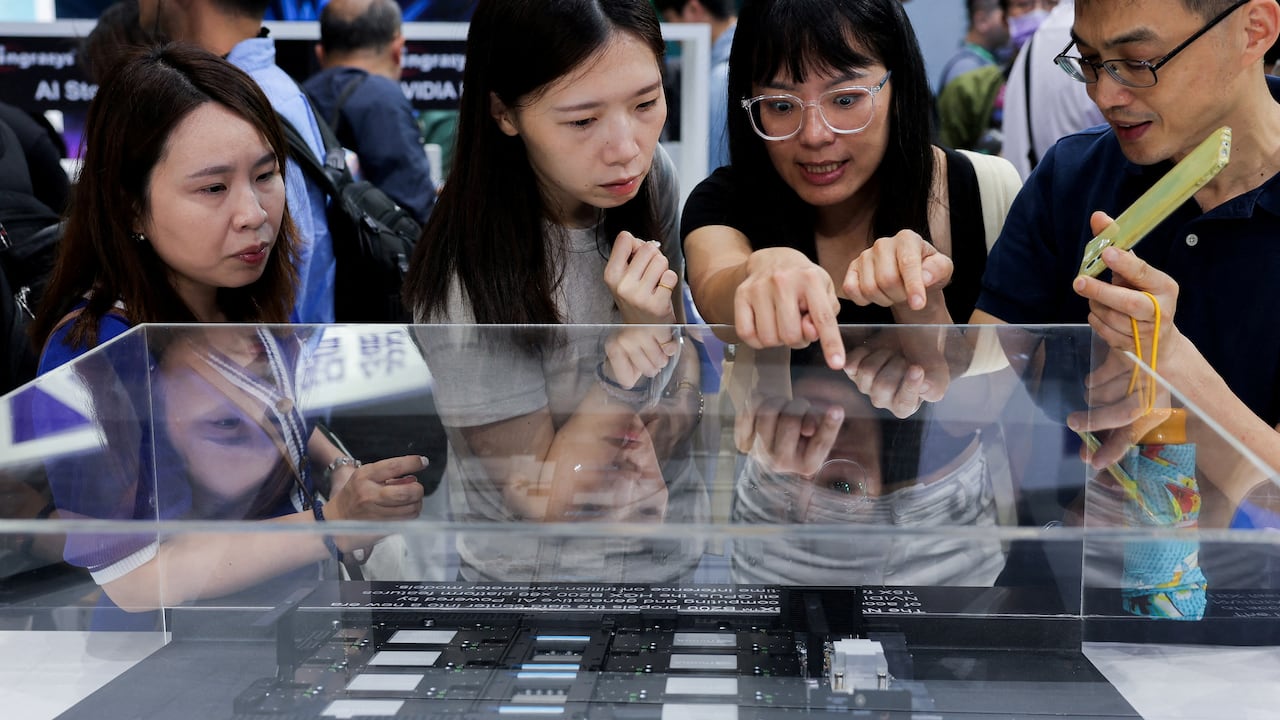 People are shown studying equipment on display at Computex in Taipei, Taiwan's capital, in June 2024. No other place in the world comes even close to Taiwan’s technological successes in the manufacturing, or foundry, market. (Anne Wong/Reuters)
People are shown studying equipment on display at Computex in Taipei, Taiwan's capital, in June 2024. No other place in the world comes even close to Taiwan’s technological successes in the manufacturing, or foundry, market. (Anne Wong/Reuters)
The microchip fabrication plants, or fabs, inside the futuristic warehouses that line the leafy streets of Taiwan’s Hsinchu Science Park are so secure and sealed off from the outside that visitors are strictly controlled.
Inside, dust-free labs house robotic machines that etch silicon wafers with nano-level precision, creating the world’s most advanced processors.
Artificial intelligence databases, iPhones, cars and practically every other piece of digital technology in existence depend on them.
No other place on the planet comes even close to Taiwan’s technological successes in the manufacturing, or foundry, market.
A single company, Taiwan Semiconductor Manufacturing Company, or TSMC, is estimated to control about 70 per cent of the world's chip market — and an astounding 90 per cent for the most advanced chips.
It's a remarkable achievement for an island of 23 million people that in the eyes of most of the world’s nations doesn’t officially exist.
Canada, like all but a dozen or so small states, recognizes the People’s Republic of China’s government in Beijing but not Taiwan, which China sees as a breakaway province.
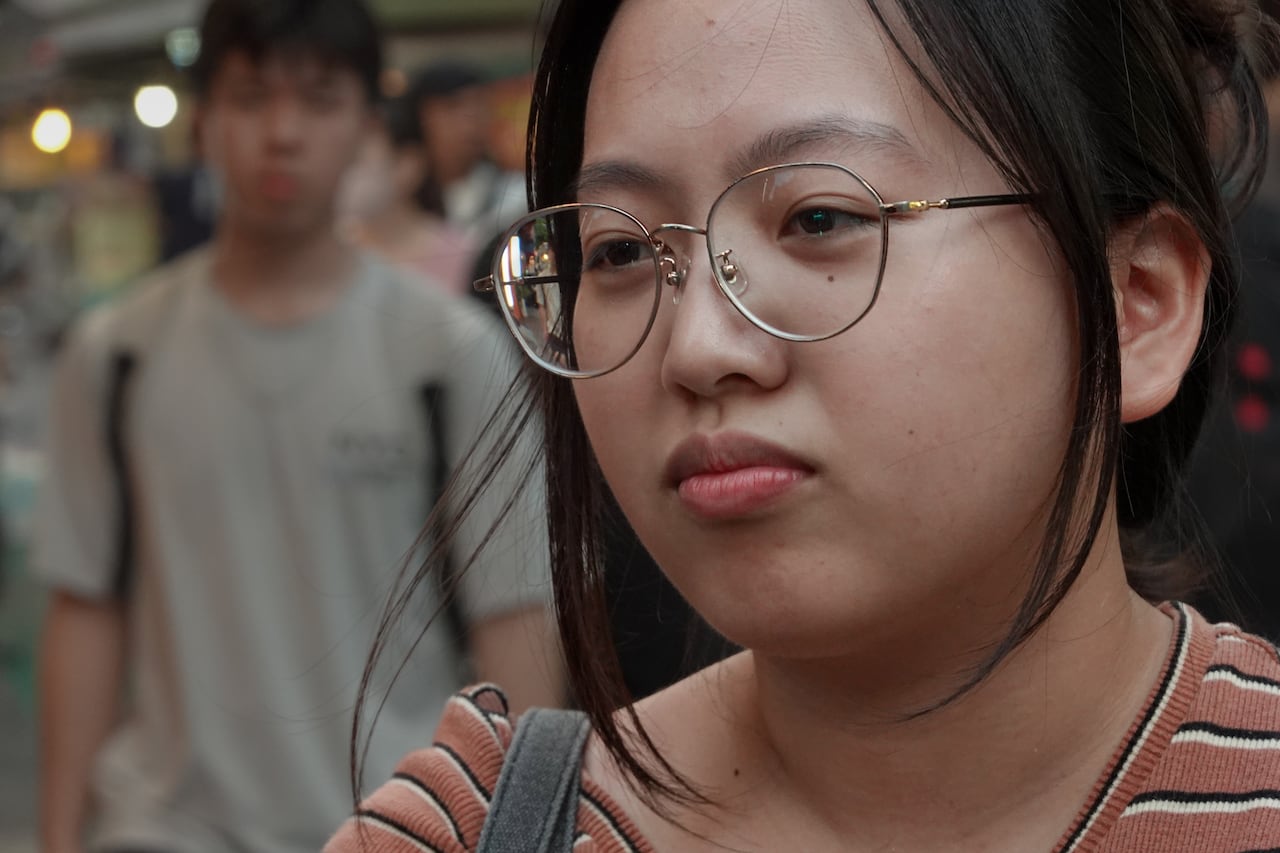 Taiwan college student Amy Lin speaks to CBC News in Taipei. (Angela Johnston/CBC)
Taiwan college student Amy Lin speaks to CBC News in Taipei. (Angela Johnston/CBC)
Lately, though, for many Taiwanese, that lack of recognition has felt like less of a slight.
“We don't have to worry too much that people don’t care about us,” said 21-year-old Amy Lin, a college student who was shopping in Taipei's Guanghua Digital Plaza, an electronics market known as Computer Street.
“We have wafers [microchips], so we have something to negotiate with others. It certainly boosts our confidence as a country.”
A 'silent nation' no more
Analysts who study Taiwan’s semiconductor industry and its impact on geopolitics concur.
“Taiwan has been a silent nation for decades,” said Jeremy Chang, CEO of the Research Institute for Democracy, Society and Emerging Technology (DSET), a think-tank that studies the links between geopolitics and Taiwan’s semiconductor industry.
His words echo the title of a 2023 documentary on Taiwan called Invisible Nation. The film chronicles the island’s long struggle to emerge from martial law and become a thriving democracy in the shadow of communist China.
“This is a very changing moment for Taiwan, that [we] finally get a chance to negotiate or to talk with like-minded allies,” Chang said. “Almost all the countries need very new semiconductors. You cannot ignore Taiwan anymore.”
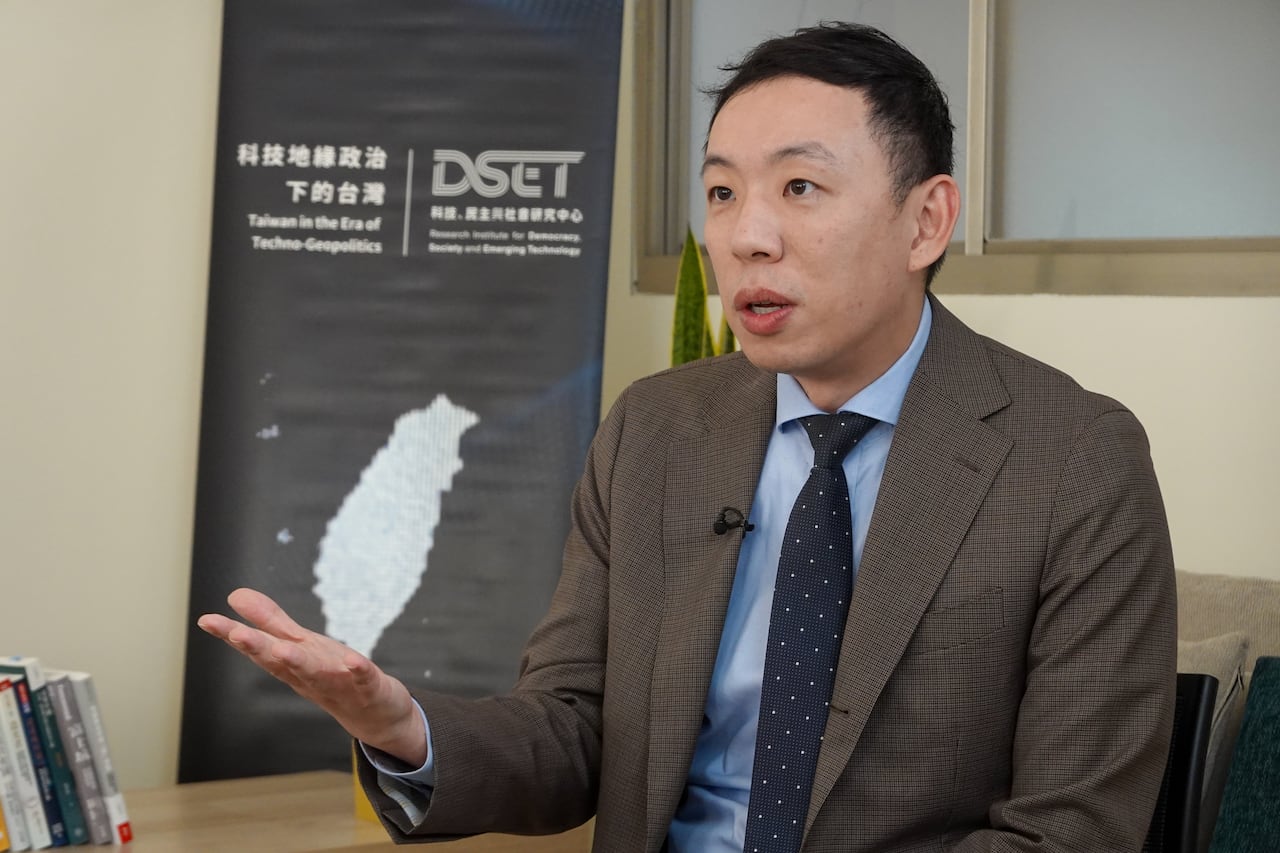 Jeremy Chang is CEO of DSET, the Research Institute for Democracy, Society and Emerging Technology, which studies the links between geopolitics and Taiwan’s semiconductor industry. (Angela Johnston/CBC)
Jeremy Chang is CEO of DSET, the Research Institute for Democracy, Society and Emerging Technology, which studies the links between geopolitics and Taiwan’s semiconductor industry. (Angela Johnston/CBC)
Chang said the world is on what he characterizes as “page one” of the artificial intelligence era, and the developments that come next will be ”totally different than what human beings have experienced so far."
By that he means that remarkable advances in robotics, drones and AI will all be anchored by semiconductors.
In an interview with CBC News, Taiwan’s vice-president, Hsiao Bi-khim, underscored that none of the island’s manufacturing success has happened by chance.
Meet Taiwan's resistance. If China invades, civil defence groups stand ready
“Taiwan has really been treated unfairly by the majority of countries around the world who do not recognize Taiwan's status,” she said.
“It took us decades to build, and it was also decades of hardship," Hsiao said, emphasizing the strategic investments, planning and training programs that have been built up by governments over 40 years.
“Under very difficult international circumstances, Taiwan managed to build one of the most comprehensive and competitive ecosystems that supports high-end manufacturing in semiconductor chips,” she said.
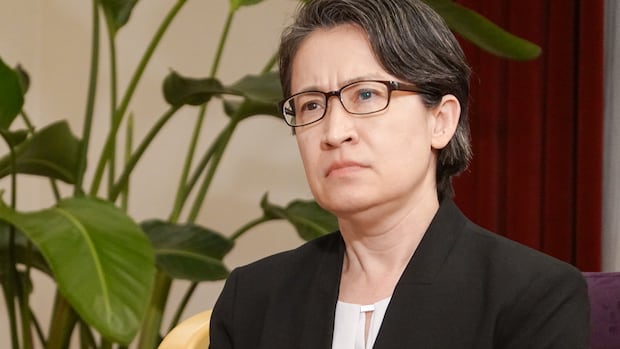
Taiwan’s global chip dominance did not ‘happen overnight,’ vice-president says
Validating semiconductor pioneers
That success is a remarkable validation for those who pioneered Taiwan’s semiconductor industry more than 30 years ago.
“I think nobody believed in this park [Hsinchu] because at that time, not many people knew how to proceed,” said tech entrepreneur Miin Wu, who was interviewed at the offices of Macronix International Co. Ltd., the firm he founded.
In 1989, Wu returned to Taiwan after earning a degree at Stanford University and working for several years in California’s Silicon Valley.
At the time, Japanese companies had a lock on the lion’s share of semiconductor business, but by designing and building a fully computerized fab, Wu said, he was able to increase efficiency and chip quality.
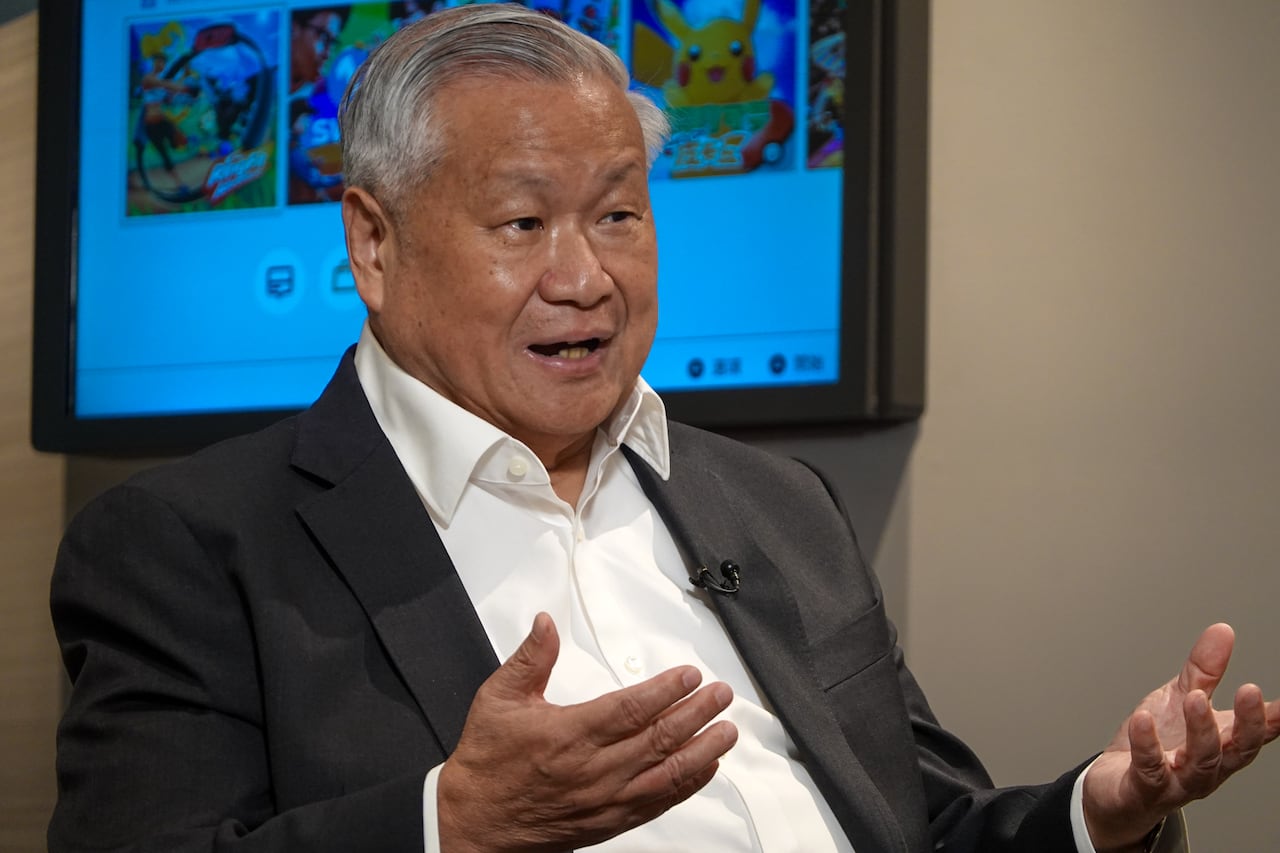
Macronix would go on to become a world leader in making flash memory chips that are used extensively in automobiles and video game consoles, such as Nintendo’s.
“Gradually we saw results from that work. Ten years later, we found our quality was way above everyone else," Wu said.
For Taiwan’s policymakers, the pertinent issue now is how to leverage the island's indispensable role in global supply chains to achieve its political goals.
In late September, during a diplomatic dispute with South Africa, Taiwan briefly raised the possibility of withholding microprocessors as punishment for downgrading the island’s representation in the country.
But that sort of blunt threat may end up being a one-off. Officials in Taipei appeared to quickly backtrack, agreeing to more talks instead.
Making microchips is likely not a particularly useful tool for coercion, say analysts, as Taiwan does not design or sell the chips it makes. TSMC, for example, manufactures semiconductors for other companies.
Nor does Taiwan have the ability to project its financial system internationally and impose export controls on items in the same way that the United States or China can.
China recently imposed export controls on several rare earth minerals to put pressure on the U.S., which had earlier moved to restrict semiconductor sales to Chinese companies.
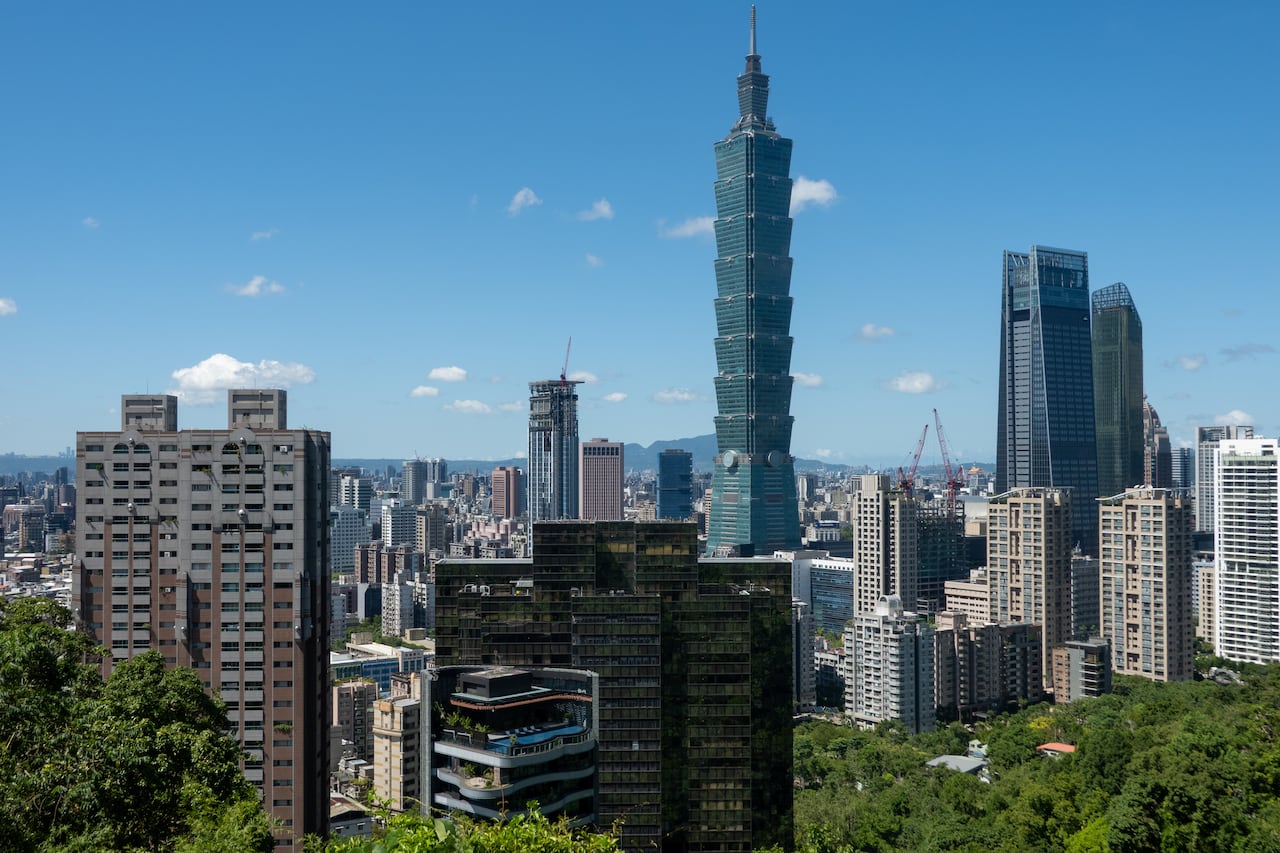 The skyline of Taipei, Taiwan's capital, features its most prominent landmark, Taipei 101, which towers over the city's financial district. (Angela Johnston/CBC)
The skyline of Taipei, Taiwan's capital, features its most prominent landmark, Taipei 101, which towers over the city's financial district. (Angela Johnston/CBC)
Regular provocations by China
Ronan Fu, a defence and political researcher with Taipei’s Academia Sinica, said he believes Taiwan should lean on diplomacy, rather than intimidation, to win more friends.
“The key issue is whether the United States is going to come to Taiwan's rescue if Taiwan gets invaded," Fu said.
Taiwan faces almost daily military provocations from China’s military, with Chinese ships and aircraft testing Taiwan’s defences. On Tuesday, for example, Taiwan’s military reported 16 sorties by Chinese fighter jets that entered the island’s air defence identification zone, along with incursions by ships.
China is also in the midst of an unprecedented production spree of ballistic missiles and other long-range weapons that put Taiwan’s main island within easy reach.
Fu said Taiwan needs to continue with its efforts to build a stronger military alliance with the U.S. and other East Asian countries, and that being embedded in the global supply chain — albeit with some distance from China — strengthens that case.
“Taiwan's role is actually to serve as a critical component of the alliance built by the U.S. The U.S. has made it crystal clear that we're trying to recreate a supply chain free of China's influence.”
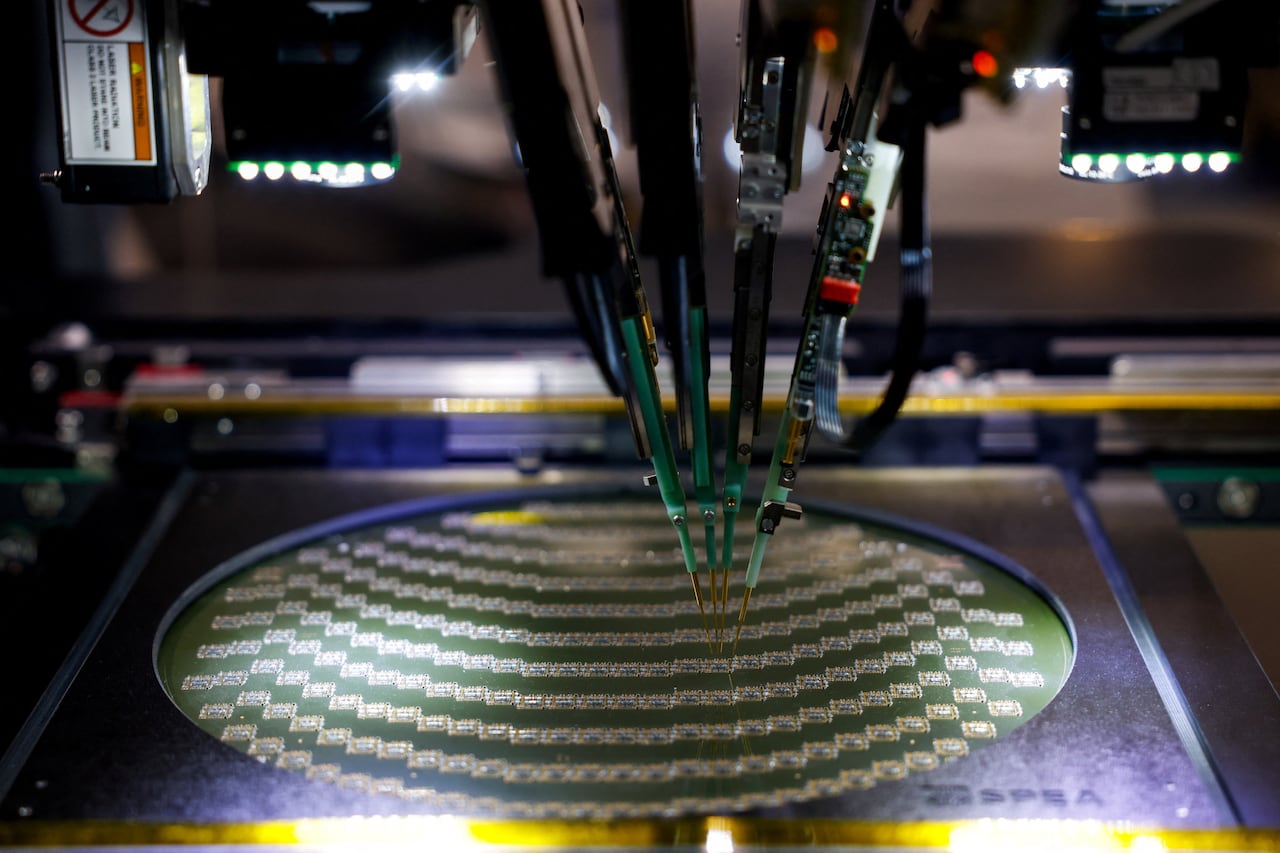 A semiconductor wafer is tested on the SPEA 4080 flying probe system, at SEMICON Taiwan 2025, in Taipei on Sept. 10. (Ann Wang/Reuters)
A semiconductor wafer is tested on the SPEA 4080 flying probe system, at SEMICON Taiwan 2025, in Taipei on Sept. 10. (Ann Wang/Reuters)
TSMC has made significant moves to strengthen its presence outside Taiwan by building state-of-the-art foundries in Germany, Japan and Arizona.
But even as it moves more business offshore, DSET CEO Chang said Taiwan will remain a global chip hub as the industry remains deeply interconnected.
“Currently, they have to send the chips that are produced in Arizona fabs back to Taiwan for packaging," he said, referring to the final stage of the production process that can greatly amplify their efficiency.
Hsiao, Taiwan’s vice-president, said her government’s focus continues to be on strengthening partnerships.
“Taiwan has always sought to leverage our influence in a positive way,” she said. “We will continue to work with friends and partners around the world who share our values and our goals."




